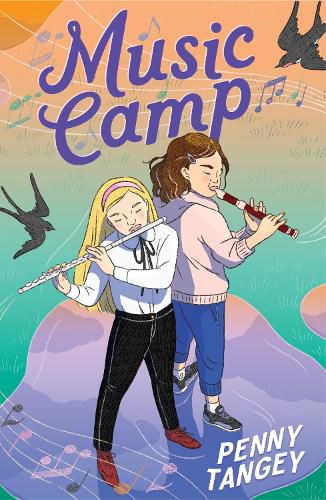Music Camp by Penny Tangey

Music Camp is an appropriate read for children in the ten through to twelve age range because the level of complexity matches children of that age in terms of language, style and voice of the characters and familiarity of the content.
Two fatherless pre-teen (Year six) girls meet on a music camp. Miley is living in a caravan with her mother as a flood has destroyed her home. She's won a scholarship to attend the camp and her aim is to have people accept recorder as a serious instrument. Flautist Juliet comes from a wealthy musical family background. The two both audition for the only woodwind solo at the final night's concert. They do not see eye to eye. Flood threatens the camp - what could go wrong?...
Like an orchestral piece, the plot unfolds from the alternating narrative view points of Miley and Juliet. The book is structured thus: Prelude (where we meet feisty Miley and bookish Juliet), Day one - Movement, Ensemble, Day Two-Auditions, Rhapsody, Day Three - Rehearsal, Accompaniment, Waltz, Day Four-Promotion, Flight of the Orchestra, Performance, Nocturne, Day Five - Finale.
Music Camp would be especially enjoyed by children who play musical instruments and who have been on or are contemplating music camps. Author, Penny Tangey is clearly inspired by her own upbringing in central Victoria, surrounded by musicians, where recorder revival was a big thing. The characters in Music Camp must juggle and come to understand and accept where they stand in the tension between excellence and performance and playing for pleasure. All the passion and hard work that sits with every musician and is a source of much pain and pleasure is quite astutely depicted by Tangey. The intense rivalries and friendships and budding romances and disappointments are cleverly described.
The childrens' growing understanding of the changing climate, the role of big corporations and the ethics of event patronage is gently developed, moving from the flood that has made Miley homeless, to the flood of the camp, to rising sea levels and environmental refugees from the Pacific. The children are developing a consciousness of their world, entirely in sync with the moral development of twelve -year- olds and protests and activism re the environment starts to interest them. It is another channel for music other than concert performance or for pleasure.
Music Camp describes a passage that ambitious children must follow to find their place in the world. Children with particular skill and passion sometimes have a more difficult path because they have to recognise and accept where their talent lies in relation to others and then to find ways to channel or use that talent. Acceptance of failure is hard. Finding a path, with the guidance of really cool and nice music teachers and other friends was what happened for the regional children at the Music Camp at a riverside cabin resort.
A warm and funny read about music camps, friends and finding your way - especially when you are smart, sassy, passionate, ambitious and maybe just a little bit different. There are good lessons in this book that the reader can learn vicariously. Teacher's notes are available.
Themes: Music in school, School camps, Friendship, Environment, Activism, Acceptance, Finding a path.
Wendy Jeffrey